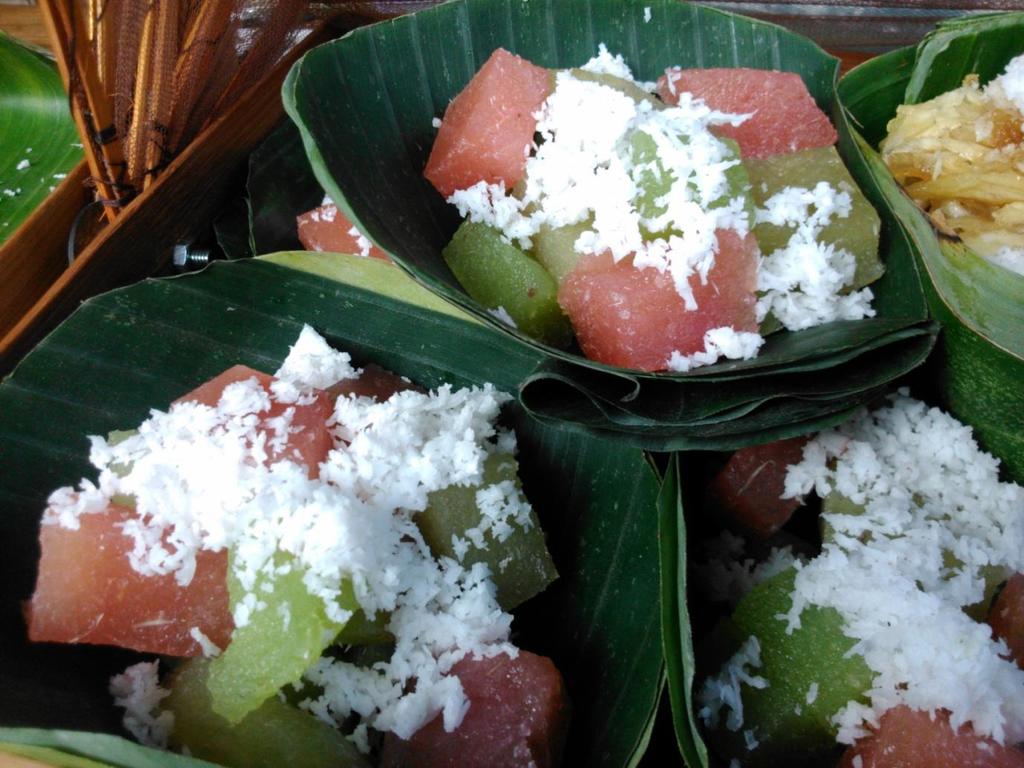Cassava, also known as tapioca or yukka root, is an edible root vegetable just like potato or taro. The plant was brought to Indonesia by the Portuguese in the 16th century and it became a popular food in the 20th century, especially in the island of Java, as rice was scarce. This led people to eat cassava (steamed or fried) as a substitute for rice and it makes sense because the rich carbohydrate it contains makes cassava a very good source of energy. Since then, people also learn to make various snacks from cassava, resulting in various types of cassava cakes. When visiting Indonesia, especially Java and Bali, you can easily find these snacks in the pasar (Indonesian traditional market where locals purchase fresh produce). Each serving costs 2000 IDR, or less than 0.20 USD! It’s unbelievably cheap, isn’t it?
If you happen to be in Surabaya, there is a shop named Klepon Jaya Abadi (eternal success klepon). Located on Prof. Dr, Moestopo Street, this shop offers a wide variety of cassava cakes (klepon, cenil, gethuk, etc.). The price is around 5000 IDR (0.40 USD) per serving, which is double compared to the ones found in local traditional markets. Nevertheless, the taste is better (they have their secret recipe that make the cakes chewier, softer and more savory) and it is more hygienic, so it is a shop you may prefer to go if you are in the city.
Klepon: Chewy dumplings with sweet fillings

While popular in Indonesia, Singapore and Malaysia, this cassava cake originates from Java. The dumplings are made from cassava dough that is filled with palm sugar and shaped into small balls before cooked. They are then coated with freshly grated coconut and served as snacks. In one bite, you’ll taste the savory coconut, soft and chewy texture of the cassava and the surprise it hides: sweet palm sugar that melts in your tongue!
Cenil: The colorful cassava cakes

Cenil, also known as klanting, is Indonesian chewiest cassava cake. It looks tempting too, due to its colorful look (they use food coloring for the dough) and the grated coconut sprinkled on its top. There is no stuffing in the cake and it has to be eaten with palm sugar sauce (you can either pour the sauce onto it or use the sauce for dipping), otherwise it will taste plain. Try this food and you will find that one serving wouldn’t be enough for you.
Sawut: Grated cassava for breakfast

Thanks to the creative mind of Javanese cooks for inventing this palatable snack that can be a rice substitute: sawut. After grating the edible root, sugar is added to the grated cassava and they steam this snack in pandan leave (for added fragrance) before serving it with grated coconut. Its texture resembles rice but it appears to be light brownish. Unlike rice that tastes plain, sawut is sweet. People usually eat sawut as breakfast although it is good as a snack anytime too.
You might be interested in these Airbnbs!
Spectacles Cake: Cassava cake filled with banana

Another variant of cassava cake is this vibrant colored snack called kue kacamata (spectacles cake). Like cenil, this cassava dough is made colorful with food coloring and comes with snowy sprinkles of grated coconut. The difference is it is stuffed with banana. Imagine the chewy dough, the savory coconut and sweet banana chewed in your mouth at the same time. Very appetizing!
Berdopo: The cassava cake rolls

These cake rolls are favorite food to many people and I’m sure you will be a fan once you’ve tried it. While other cake rolls are made of flour, butter and baking soda, berdopo’s ingredient is cassava and it is steamed, not baked. This one’s got a surprise inside. In a bite, you’ll find the roll is filled with enten-enten, a sweet mixture of grated coconut and palm sugar. Try it and I’m sure you’ll want another roll.
Gethuk: Sweet and tender cassava cake

If you like sweet and tender cassava cake, gethuk is the one. Like mashed potato, gethuk’s texture is tender. This tender texture is different from other cassava cakes, which are chewy. This is due to the different cooking processes. While the chewy cenil, klepon or spectacles cake are made using cassava dough, gethuk is made by mashing steamed cassava and mixing it with palm sugar. Gethuk can be enjoyed as it is or, just like other cassava cakes, served with grated coconut. Either way, it’s yummy.
More variations of cassava cakes
Chewy and tender, the cassava cakes are the local snacks that you must not miss when you are visiting Indonesia. These are just a few variations of cassava cakes that you can find in Surabaya and other parts of Indonesia. There are still dozens of other delicacies that you can buy in traditional markets in the country. Believe it or not, you won’t find these kinds of cassava cakes anywhere else, but only in Indonesia! If you want to try all these cassava cakes, why not come to Indonesia and experience the delicacy of cassava?
History
Get Trip101 in your inbox
Unsubscribe in one click. See our Privacy Policy for more information on how we use your data




















Create an account to